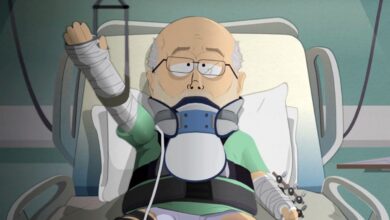Katie Couric Spoofs Sydney Sweeney in Colon Cancer Screening PSA (Exclusive)
:max_bytes(150000):strip_icc():format(jpeg)/katie-couric-Colorectal-Cancer-Alliance-and-Maximum-Effort-092425-2849d2bb8700456687eb83329e63efa1.jpg)
NEED TO KNOW
- Katie Couric spoofs Syndey Sweeney’s controversial American Eagle ad in a new public service announcement about colon cancer screenings
- “Screening is something that people often put on the back burner, ” Couric tells PEOPLE, adding that it requires “consistent reminding”
- Couric, 68, is a longtime cancer research advocate and breast cancer survivor; her husband Jay Monahan died from colon cancer in 1998
Katie Couric stars in a new public service announcement about colon cancer screenings that spoofs Sydney Sweeney’s controversial American Eagle commercial.
“That ad showed how pop culture and a pair of jeans could really shape the cultural conversation … it was everywhere,” Couric, 68, tells PEOPLE. “It was a moment in time, and we thought, ‘Why don’t we ride that horse a little bit longer and have some fun with it?’ ”
The PSA begins with a close-up shot of Couric, lounging in a denim jacket while sexy music plays in the background. As the camera pans out, Couric is revealed to be wearing a hospital gown under her jacket — and she’s lying on a gurney as medical professionals prepare her for a colonoscopy.
“It was funny for me because I’m a little older than Sydney Sweeney, and I was trying to get the jean jacket to lay just so,” Couric tells PEOPLE.
“Speaking of genes,” Couric begins the ad — a nod to the dialogue in Sweeney’s ad — ”did you know that the majority of people who develop colon cancer are not genetically predisposed to the disease? That’s why doctors recommend everyone 45 and older get checked.”
The public service announcement is part of the Lead from Behind campaign initiative from the Colorectal Cancer Alliance and Maximum Effort, co-founded by Ryan Reynolds.
“The mission of the Colorectal Cancer Alliance is very near to my heart. And my ass,” Reynolds said in a statement. “When Rob Mac and I broadcast our colonoscopies to help launch Lead From Behind, we were following in the brave footsteps Katie took 25 years ago,” he said, referencing her groundbreaking on-air colonoscopy when she was an anchor on NBC’s Today in 2000.
“So to have her work with Maximum Effort on the latest initiative is a real full-starfish moment for me,” Reynolds said.
Craig Barritt/Getty for The Women’s Media Center
Years after that iconic on-air colonoscopy, Couric took Jimmy Kimmel to get a colonoscopy on camera in 2018. Her dedication to cancer research and screenings “has been near and dear to my heart since I lost my husband in 1998,” she says, referring to Jay Monahan’s death from colon cancer at age 42.
The legendary journalist also references her longtime advocacy in the new PSA.
After a voiceover booms, “Katie Couric gets regular screenings. And if you’re 45 and older, you should too,” Couric playfully says, “Mine are televised.”
As Couric tells PEOPLE, “screening is something that people often put on the back burner. They don’t think about it or it’s not at the top of their to-do list. And it’s one of those things that honestly needs consistent reminding.”
Couric, whose breast cancer was detected and treated early due to regular screenings, has dedicated much of her time to supporting cancer research and awareness. Along with co-founding the National Colorectal Cancer Research Alliance, she’s also the co-founder of Stand Up to Cancer, and the Jay Monahan Center for Gastrointestinal Health.
“I’m a grandmother now,” Couric tells PEOPE, saying her late husband “would’ve been a grandfather … my girls graduated from college and these huge life moments that he’s missed — I don’t want that to happen to other people. And so I think of him often, and think of other Jay Monahans that might be out there, whose lives I can potentially I save with this information. So I feel such an obligation and a responsibility to do that.”
Colorectal cancer, which typically affects older adults, “begins as small clumps of cells called polyps that form inside the colon,” according to the Mayo Clinic. Polyps usually don’t show symptoms, which is why regular screening tests to find and remove polyps helps to prevent illness. And while not all polyps will become cancer,“ finding and removing polyps helps prevent colon cancer,” the Mayo Clinic says.
NBC
The PEOPLE Puzzler crossword is here! How quickly can you solve it? Play now!
As the American Cancer Society points out, a polyp can take up to 15 years to turn into cancer, so “with a colonoscopy, doctors can find and remove polyps before they have the chance to turn into cancer.”
“The more we talk about it, the more people will say, ‘Gosh, I need to call my doctor,’ ” Couric tells PEOPLE. “And the more people call their doctor, the more people will find out that they have a potential problem that can be cured.”
Colorectal cancer is the second leading cause of cancer deaths in the U.S. and the third worldwide. Regular screening is recommended starting at age 45, the American Cancer Society says. However, fewer than 60% of people who are eligible are up to date on their exams. And as Couric tells PEOPLE, “By 2030, the number of people under the age of 50 diagnosed with colon cancer is expected to double.”
“Early detection saves lives. It’s really that simple,” Couric tells PEOPLE. “If you can get a cancer that’s detectable at its earliest stage, your chances of survival just go up dramatically. So get screened.”
Credit to Nypost AND Peoples



